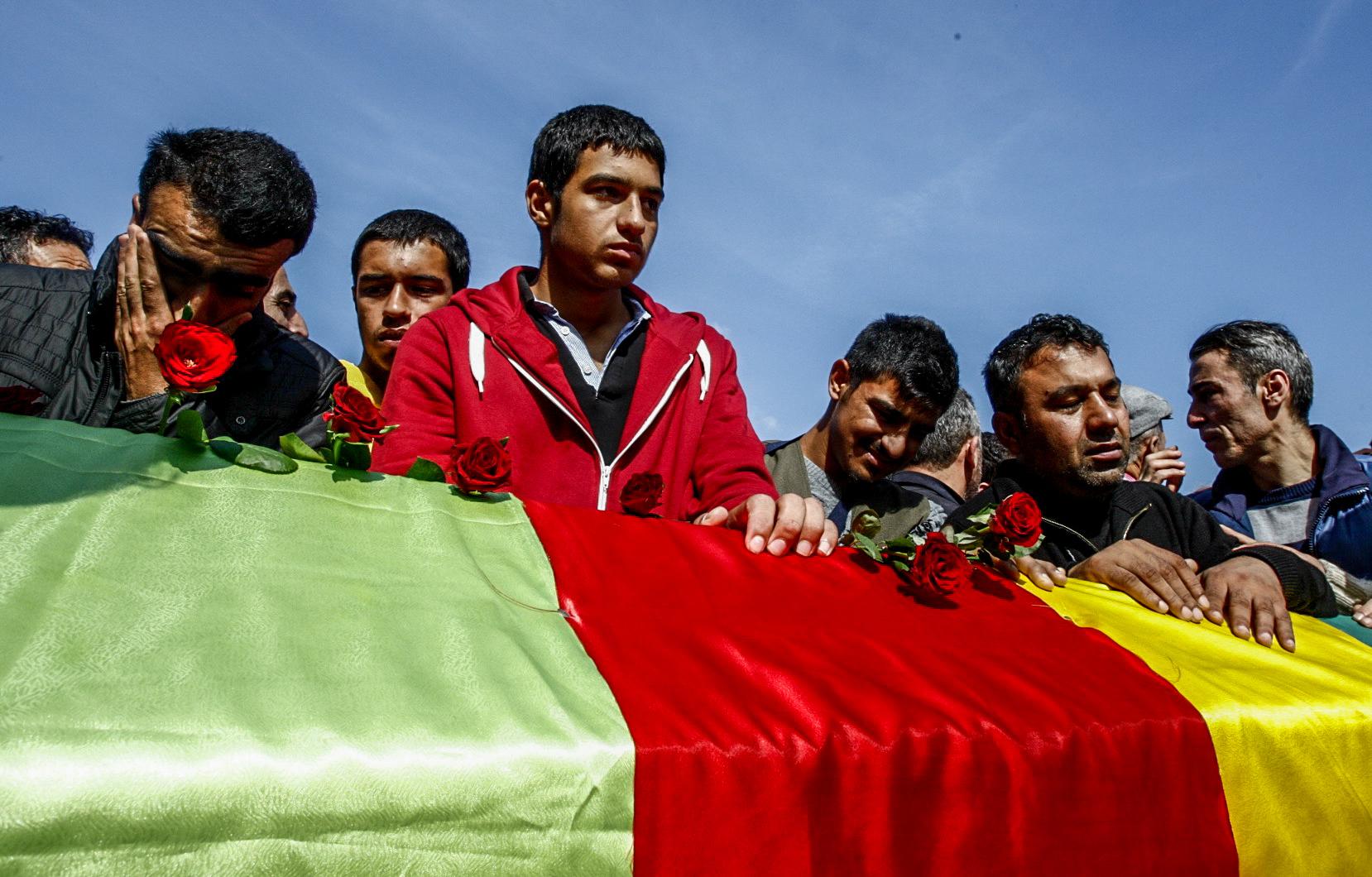Turkey’s deadliest terror attack divides the country more than ever
Relatives mourn during the funeral for a victim of Saturday's Ankara bomb attacks, on Oct. 12, 2015, in Istanbul, Turkey.
ANKARA, Turkey — Outside a hospital’s emergency ward in the Turkish capital, one mother threw her hands in the air and burst into tears. “Allah, where are you? It’s enough already. Our children are dying,” she cried.
Her son was one of hundreds wounded in Saturday’s suicide bombings in Ankara, when twin explosions struck a peace demonstration, killing at least 97 people. With dozens still in intensive care, families and friends gathered outside the city’s hospitals for news.
On the second of three days of mourning, no one had come forward to claim responsibility. Turkey’s prime minister, Ahmet Davutoglu, on Monday declared the Islamic State the prime suspect, but added that authorities continued to investigate a plethora of militant groups.
For the Kurdish mother outside Ankara’s Numune Hospital, there was no doubt about who was to blame. “The president is killing my child,” she shouted, accusing the government of complicity in the bombings.
But another woman, also waiting to hear about her child’s condition, shouted back to defend the government. “This is your doing, yours and your people’s,” she yelled at the Kurdish mother. Bystanders had to separate the two women.
With violent clashes between Kurdish militants and security forces ongoing in the country’s southeast, the bombings are threatening to plunge Turkey, a key NATO member, into deeper instability.
Far from uniting an already polarized nation, the deadliest-ever terror attack on Turkish soil has further divided the country and its leaders ahead of next month’s snap elections.
After initial calls for cooperation, political parties were quick to blame one another. The leader of the pro-Kurdish HDP, Selahattin Demirtas, said the government had “blood on its hands,” blaming the state for failing to prevent the attacks.
Davutoglu, in turn, criticized Demirtas for his statement, saying: “No politician in a modern state anywhere in the world would turn and blame his state when faced with a terrorist attack such as this one. He would blame terrorists.”
On Monday, Davutoglu said authorities were close to identifying one of the bombers, adding that IS may have been behind the bombing, although Kurdish or leftist militants were also possible suspects. Security sources said the attack resembled the Suruc bombing in July, when 33 activists died in an attack blamed on an IS-linked militant.
While rumors over the perpetrators’ identity abounded, mourners filled the streets in protest against the government. Thousands have attended funerals and commemorations across the country since Saturday, chanting “murderer Erdogan” and “government, resign.” The four unions that organized the peace march announced a two-day strike.
More from GlobalPost: Turkish author and Nobel laureate Orhan Pamuk blames Erdogan for bringing country to brink
On Saturday, people had gathered at Ankara’s main railway station to protest against the resurgent conflict between Turkish security forces and the Kurdistan Workers’ Party (PKK), a group considered a terrorist organization by Turkey, the US and the European Union. Two hours before the march was scheduled to start, two explosions tore through the crowd.
“I arrived ten minutes later. There were people in shock, people running, screaming, hugging each other,” said Turan Baykan, an HDP member who lost two friends in the attack.
“I saw body parts, heads and legs and arms everywhere,” said Nur, a taxi driver who was waiting for customers at the train station. “When I was in the army I learned first aid, so I tried to help. I drove people to [the] hospital when police blocked the ambulances.”
Many who stood close to the scene said police officers prevented help from reaching the wounded. Amateur footage of the immediate aftermath showed riot police clashing with disoriented survivors, beating some with batons and firing tear gas.
“Why would you do that to your own citizens, the people that you should have protected?” Baykan asked.
Saturday’s attack was the third bombing to target civilians after Suruc and twin explosions that killed four at a HDP rally in the southeastern city of Diyarbakir in June. The HDP claimed that these attacks were “clearly linked” in a statement published on Monday.
Following the Suruc bombing, the PKK ended a two-year ceasefire and resumed its war against the Turkish state, a conflict that has killed 40,000 over three decades, including at least several hundred since July. Ankara responded by bombing PKK bases in northern Iraq while also joining the US-led airstrikes against IS in Syria.
On Saturday, the PKK’s leadership declared a pre-election ceasefire on the condition that Turkey also halted its raids, a move dismissed by Ankara. Militants killed two soldiers on Sunday, sparking fresh strikes against PKK camps in Iraq. A child and a police officer reportedly died during fighting in Diyarbakir on Monday, although the PKK pledged to uphold the ceasefire in honor of the Ankara bombing victims.
Threats of a spillover from Syria are also mounting. Last week, Turkey raised alarm when Russian planes strayed into its airspace after Moscow launched airstrikes in support of the Assad regime. The European Union, meanwhile, is asking Ankara for help to stem the flow of migrants and refugees crossing from the Turkish coast to Greece.
Amid these challenges, the country has found itself in a political gridlock after the June elections, in which Erdogan’s AKP lost its majority for the first time since rising to power 13 years ago. The HDP has accused Erdogan of inciting violence and escalating the conflict with the PKK to regain lost votes.
Despite security concerns following the Ankara bombings, the government has insisted that the election on Nov. 1 will go ahead as planned.
